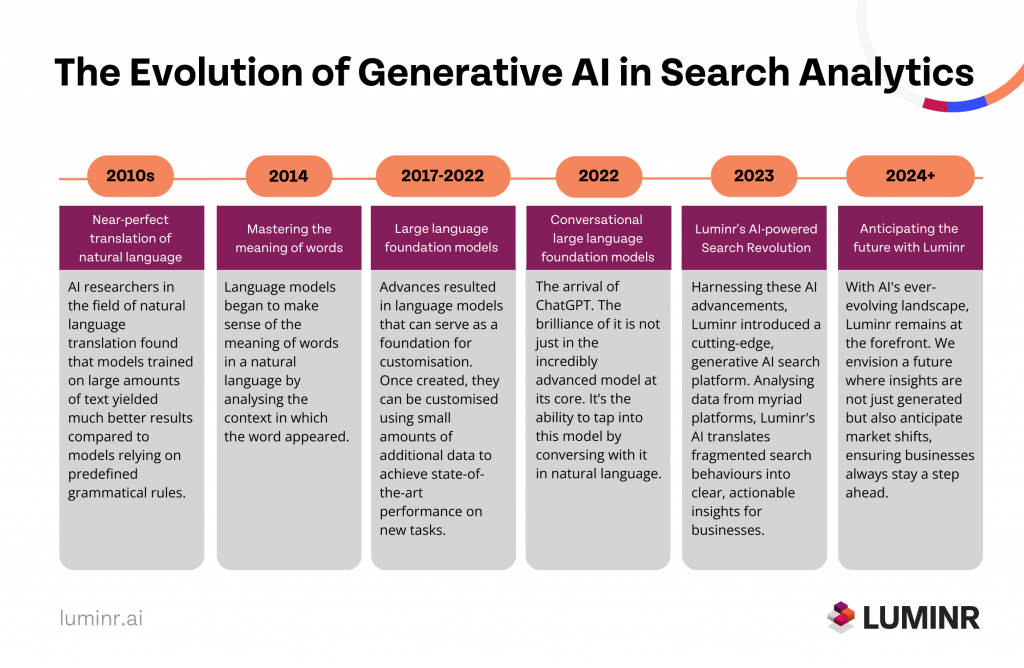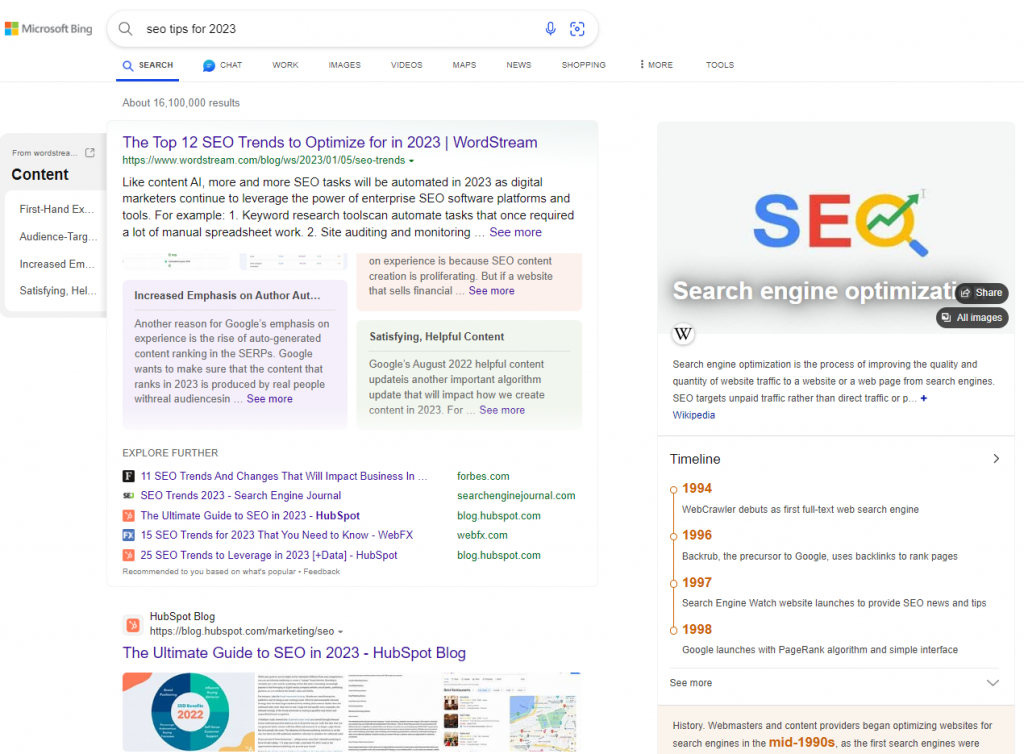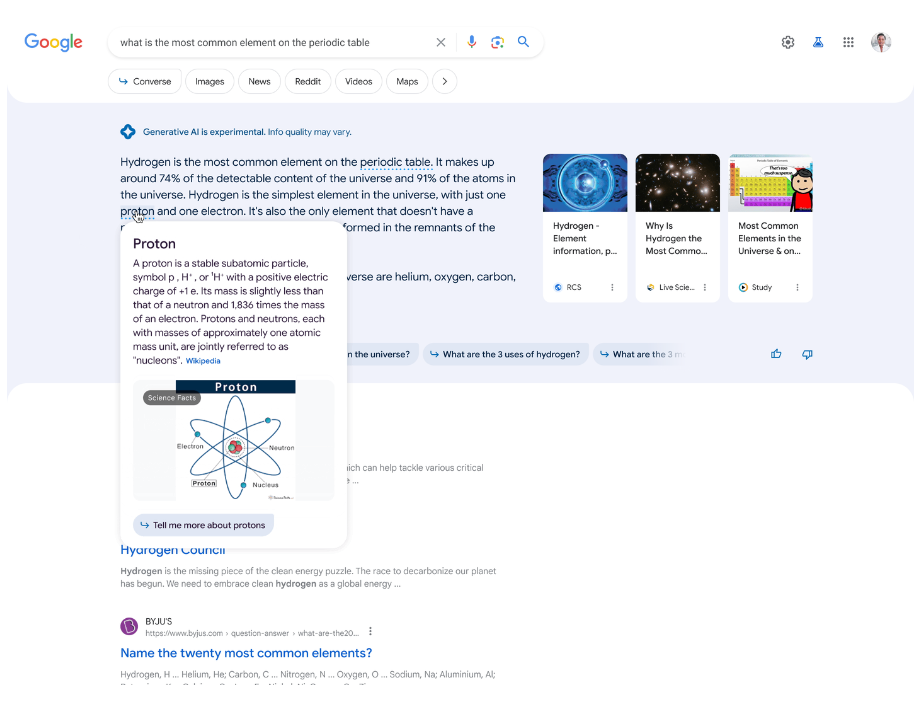

How to Navigate the Future of Search with Generative AI?
Written By Otilia Crizbasan | 9 October, 2023
Exploring the transformational journey of modern searches
Imagine having a conversation with your computer where it not only understands your intent but can also craft responses or content that feel (almost) human.
This is no longer the realm of science fiction – it’s our digital reality.
From the magic behind large language model-based chatbots like ChatGPT to traditional search engines like Bing and Google, Generative AI is revolutionising the way we interact with the digital world.
According to McKinsey Global Survey, 79% of the respondents had at least one exposure to Gen AI. And 22% regularly use it in their work.
Delve deeper to learn the vast potential of Generative AI and how it’s reshaping the digital landscape.
What is Generative AI?
Generative AI is a broad term that’s used to describe any type of AI that can be used to create new text, images, video, audio, code or synthetic data.
Robert Vinter, Data Scientist at our sister company Braidr, notes: ”Generative AI, as the name suggests, comes from generating new output using the power of AI. We can get many types of outpus, like text, images, audio and even synthetic data. Based on what type of content we want, there are different types of Machine Learning models, for images or audio we got Generative Adversial Networks (GANs), for text we got Large Language Models (LLMs).”
In short – if an AI can make something new on its own, it’s called “Generative AI.”
According to Garnter’s experts, Generative AI keeps getting smarter through various evolving techniques. Among these are AI foundation models, which are trained on a broad set of unlabeled data that can be used for different tasks, with additional fine-tuning.
And it already started to change the nature of the search engine results page (SERP).

How is Generative AI search different from regular online search?
Usually, you type a question or keyword into a traditional search engine like Google or Yahoo. These engines then list websites based on certain factors, including:
- the words of your query
- relevance and usability of pages
- expertise of sources
- your location and settings
The weight applied to each factor varies depending on the nature of your query. For example, the freshness of the content plays a bigger role in answering queries about current news topics than it does about dictionary definitions.
Generative AI search aims to upgrade in how we search online. Instead of giving you millions of results, it processes your query through AI to assist you more directly.
If you have a question, it fetches information from what it knows to provide an answer. If you need help with something, it tries to assist. It’s like having ChatGPT, but within a browser interface.
To make it more clear, let’s explore some examples below.
Platforms that use Generative AI search
- Microsoft Bing
Microsoft harnessed OpenAI’s advanced technologies to supercharge Bing Search. Their enhanced version is now called The New Bing.
Instead of just providing keyword-based website rankings, the search engine gives comprehensive answers to your queries. It’s like having a conversation with an expert in your field.
In this chat feature, you can ask up to five additional questions to refine your results, thanks to the power of the Generative AI model behind it. Beyond just web searches, the new Bing offers:
- Expert advice on a range of topics
- The ability to generate creative content using AI capabilities similar to ChatGPT
- Direct, accurate search outcomes

Google has introduced a generative AI-powered Search system called SGE and has been enhancing it to offer users a better experience.
Let’s take a question like “what’s better for a family with kids under 3 and a dog, bryce canyon or arches?”. Normally, you might break this one question down into smaller ones. And sort through the vast information available, and start to piece things together yourself. With generative AI, Google can do some of that heavy lifting for you.
You’ll see an AI-powered snapshot of key information to consider, with links to dig deeper.

Among other exciting updates, Google is planning to release a feature that will improve the AI’s responses for a range of topics, from science and economics to history. So when you come across specific words, you’ll be able to hover over them and see a quick definition, along with related images or diagrams.
So if you want more information, all you need to do is click on it.

However, Robert warns: “It’s true, these assistants are making our life easier, helping us find answers to different questions much faster, or even solve a variety of tasks. But one essential thing that should be considered is the multiple source checking. Keep in mind that these models are trained on huge amounts of data, and there is always a possibility of providing wrong answers. So as a safe mechanism, all the content that we are getting from a Generative AI model should be double-checked before its usage.”
3 ways marketers can leverage Generative AI in search
- Asset generation
We’re talking about generating intelligent visuals for search engines. Search engines are becoming more visual, and generative AI can help marketers create images and videos that are relevant, engaging, and optimised for search engines.
For example, generative AI can help marketers create product images that match the user’s query, or generate video thumbnails that capture the attention of the viewers.
- Ad creative testing
A/B testing is a vital aspect of paid search strategies. Generative AI can automate the ad creative testing process by generating multiple versions of ads and analysing their performance. This provides valuable insights into which ad elements, such as headlines, images or calls to action, drive the best results.
- Predictive performance analytics
Generative AI can provide predictive analytics to forecast paid search campaign performance. By analysing historical data, market trends and user behaviour, marketers can predict the potential outcomes of different bidding strategies, budget allocations, and targeting approaches. It helps them to make data-informed decisions and optimise their campaigns proactively.
Final thoughts
As it advances, Generative AI is significantly influencing the future of search, delivering more tailored outcomes for users globally.
By understanding the core principles and ethical aspects of Gen AI search, we can leverage its potential and delve into its vast opportunities for innovation.
Luminr’s AI translates fragmented search behaviours into clear, actionable insights for businesses by analysing data from myriad platforms.
Get in touch with our team to discover how we can help you dominate search.





